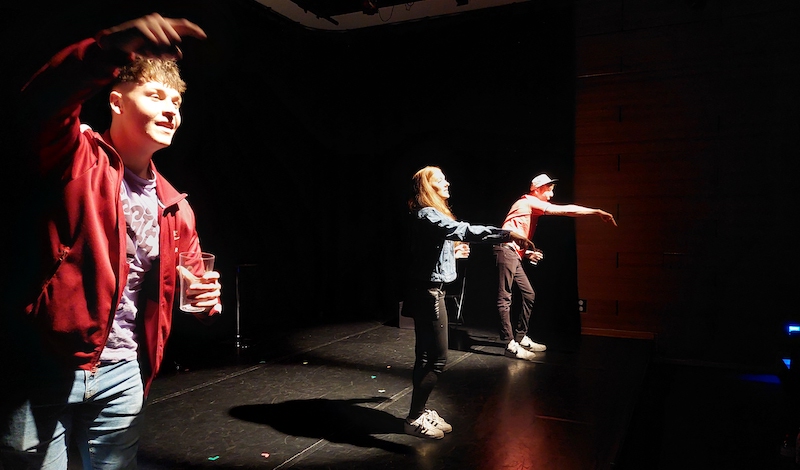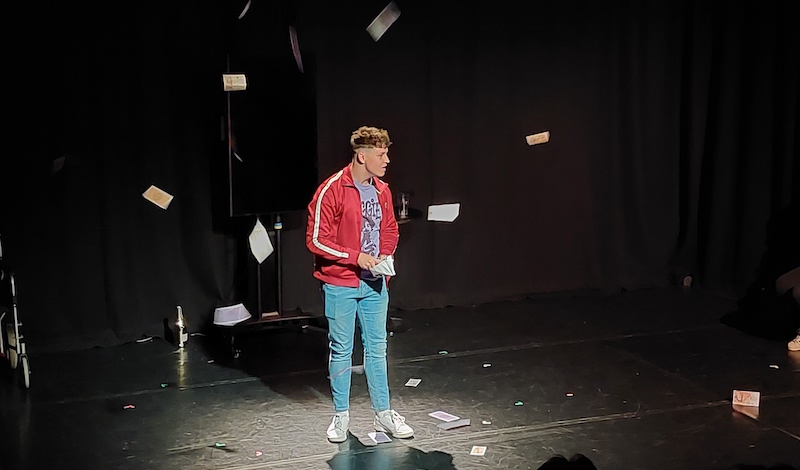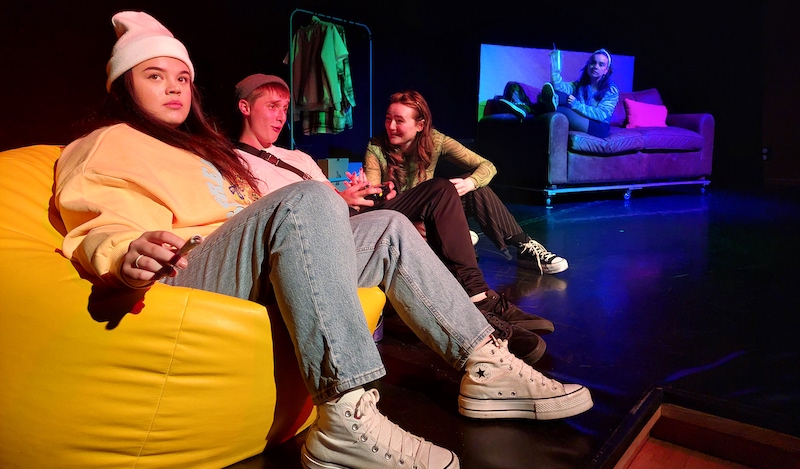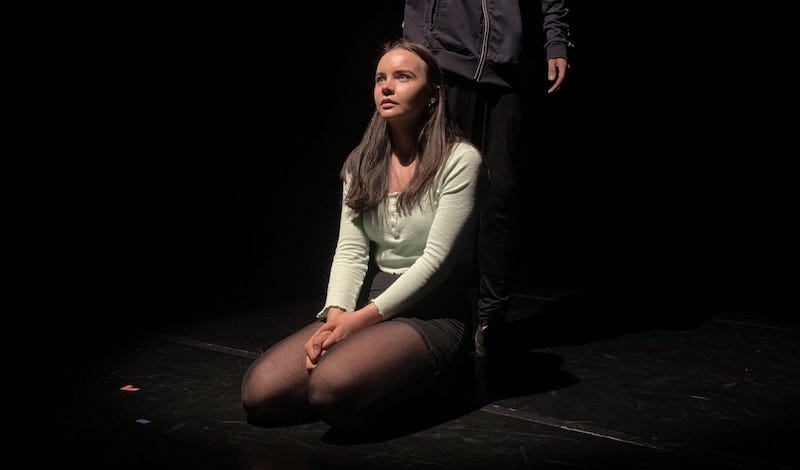Trust Me & Wasted
★★★★☆ (Trust Me) & ★★★☆☆ (Wasted)
The Festival of Peer Inspiration
Scottish Storytelling Centre: 30 May – 1 June & 8 June
Review by Thom Dibdin
The Festival of Peer Inspiration is a chance to see two pieces of theatre of a kind which tours widely through Scotland’s schools, but which is rarely even acknowledged in the wider theatre community.
Produced by Fast Forward and Rolled Up Productions, and building on work started with Strange Town Theatre Company, this is theatre which explores the edges of young people’s lived experiences, the situations where they can become compromised.
It might have an issue-based ambition but, like all theatre, it lives or dies on its ability to engage with its audience and to find stories to which they can relate. It does have an edge, however, in that it has been created with and by young people.
The first of the two pieces is the much travelled Trust Me by Duncan Kidd, about a young man caught up in online gambling. Originally created with Strange Town, it toured extensively before the pandemic (for some time under its previous title of Flutter) and was also produced as a film during lockdown.
Calum Manchip plays Jack, whose footballing dreams are brutally cut short with a career-ending tackle and who is spending the year after leaving school working in Poundland. He’s got a holiday in Ibiza with his pals Becky and Ryan to look forward to, however, and the prospect of college.
Under Kai Peacock’s canny direction, Manchip gives Jack an often brutally honest realism as he reveals in extended flashback how he came to be in a pub cheering on a horse, and how his life came down to this one, win-or-lose-all moment.
a sense of realism
Iona Mclennan’s Becky has a similar sense of realism, creating an empathetic character who it is easy to believe can weather Jack’s foibles. In a black-box space in which a single large TV screen is used to indicate different scenes, this humanity comes into even sharper focus.
By complete contrast, Harrison MacNeil fills in with a series of caricatures who are all quite believable in their own right, but who serve to drive the rest of the plot. They are, in many ways, framed in the way that the increasingly self-obsessed Jack sees them.
Best pal, pill-popping wag Ryan is the most well drawn of these, while there is a pathos to MacNeil’s representation of Jack’s chain-smoking, wheel-chair using dad – and he brings a menace to Snodgrass, Jack’s boss at Poundland. MacNeil brings a versatile and engaging comedy to the stage.
The whole piece feels solidly contemporary – the pandemic gets a namecheck – with phones used well. Animator Rob Small has done a great design job on the online bookies and betting app. The on-stage screen is in portrait orientation, all the better to show the screen in Jack’s hand, or the pub chalk-board advertising a quiz night.
the power of theatre
Indeed, having seen the film of this, the stage production is a clear demonstration of the power of theatre to take its audience where it wants. There is a certain self-consciousness to the screen version’s scenery that doesn’t immerse in the way this version does.
The second piece, Wasted, is also by Duncan Kidd and was first staged with Strange Town. It is seen here in a new version adapted and directed by Marnie Russel specifically for the Festival of Peer Inspiration. It follows a couple of pals on the lash at a house party: the naive and geeky Lucy and her best pal Charlie, who thinks she is far more worldly wise, thanks to watching her older brother.
Told in a linear narrative, it simply follows the pair as they prepare for the night out and then navigate the evening through to its end. Both Lucy MacGarvey as Lucy and Jade MacDonald as Charlie create strong, believable characters – both are relatable and easily recognisable.
Once again, there is a sense of realism to the central characters – although there is added ambition here: MacDonald doubles as Rosie, the hilarious (on the surface) host of the house party, with Kyle Doig and Emily-Louise More both playing a pair of characters each.
a realistic subtlety
Wasted asks its actors for that notoriously tricky kind of performance – acting drunk. To the credit of all the actors, there is little doubt about the various inebriated states their characters go through. There is a realistic subtlety here, too, as is completely necessary to give the whole piece any credibility.
Both plays benefit from their decision not to preach. Both have realistic representations of drug taking and under-age drinking which are shown without condemnation or moral judgement.
It is telling that Wasted’s weakest element is the character of bullying next-door neighbour, Liza, who Emily-Louise More has a hard time making feel convincing. It’s partly a tricky bit of staging but most the writing, which gets too blatantly judgemental and loses its power as it does so.
A voice-over and projection, outlining the effects of increasing percentages of alcohol in the bloodstream, doesn’t chime either. Without any synchronisation with a character it disturbs the narrative and makes it feel contrived.
Watching both pieces with an audience of an age for which they were written, it is clear that they engage as provocations for discussions based around issues – but more than that: they are both engaging pieces of theatre in their own right.
Each play runs for 45 minutes without an interval.
The first Festival of Peer Inspiration at the Scottish Storytelling Centre, 43-45 High St, EH1 1SR.
Mon 30 May – Wed 1 June & Tue 8 June.
Links:
Fast Forward website: www.fastforward.org.uk
Fast Forward Twitter: @fastforwardorg
Fast Forward Facebook: @ScottishPeerEducationNetwork
Rolled Up Productions: https://rolled-up.co.uk
ENDS






















